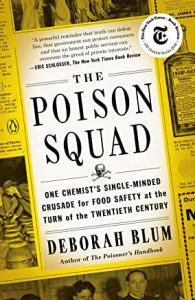
How was your Thanksgiving meal? I hope the food was delicious, fulfilling, and safe. That hasn’t always been the case, as pointed out in Deborah Blum’s book, The Poison Squad.
Travel back in time to the early 1900s to observe the state of food safety in the United States. Formaldehyde. Coal tar. Salicylic acid. Lead. Borax. These were added to many food products. Chalk was used to make thinned milk appear whiter and thicker. Formaldehyde (embalming fluid!) was used to extend its salability. Decaying meat was preserved with salicylic acid. Food was dangerous. People died.
This was the situation during the industrialization of the food industry in the United States. Large-scale processing and distribution with no oversight created conditions that pushed profit over safety. Enter Dr. Harvey Wiley, federal chemist and crusader who fought for change. The book chronicles his efforts.
The name of the book came from the moniker for the volunteers who participated in Dr. Wiley’s tests. Under controlled conditions, The Poison Squad agreed to consume food with additives commonly found in food at the time. Many became ill. Wiley felt it was time to expose the dangers of these ingredients which were “generally recognized as safe.”
Wiley faced significant push-back and needed help in spreading the word. He received that support from the Women’s Christian Temperance Union, Good Housekeeping magazine, Fanny Farmer, and Henry J. Heinz. Still, the struggle lasted decades before the Food and Drug Administration was created.
Unlike Upton Sinclair’s The Jungle (which was featured in the book), The Poison Squad is not fiction. It is a well-researched history of an intricate battle between lobbyists and government over food safety. The Wall Street Journal review called it: “A detailed, highly readable history of food and drink regulation in the United States. . . . [THE POISON SQUAD] shows the push and pull of competing economic, political and social interests. The journey our country has taken in establishing food, drink and drug regulation is an important one to understand because it is still going on.”
I discovered this book through my book club, but it is also this year’s UW-Madison’s Go-Big-Read selection. Go Big Read is an annual initiative of the university to engage the campus and the larger community in “an academically-focused reading experience.”
And it is worth the read. Not only does it have an historical perspective, it also has a déjà vu quality to what is happening in society today. It’s eye-opening and thought-provoking information.
